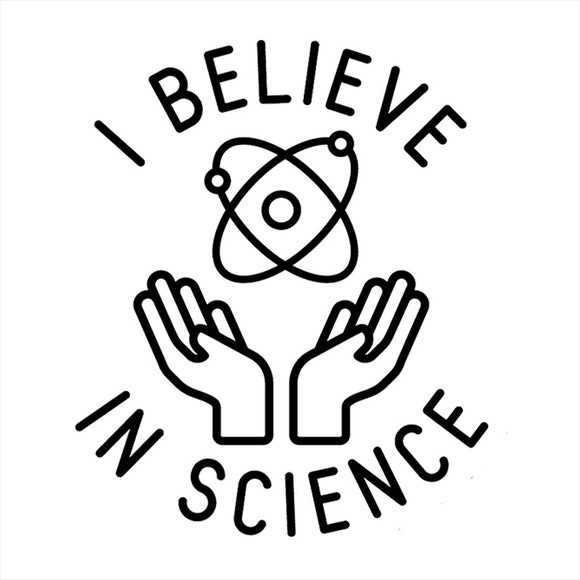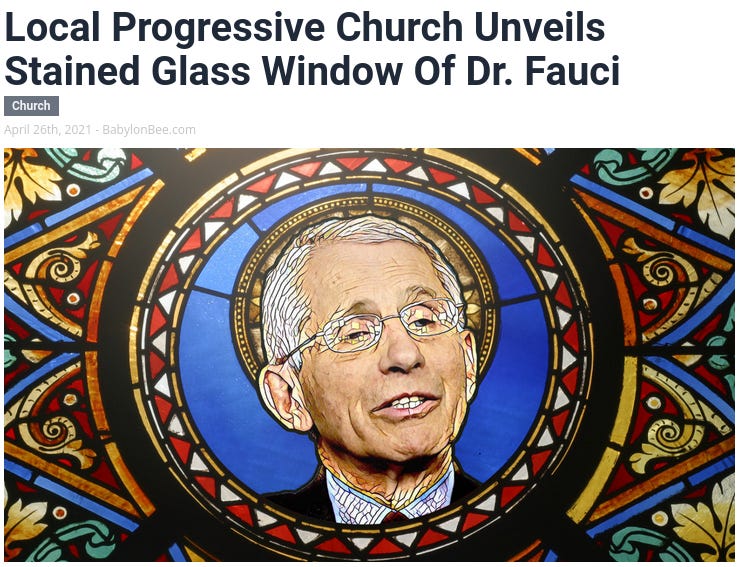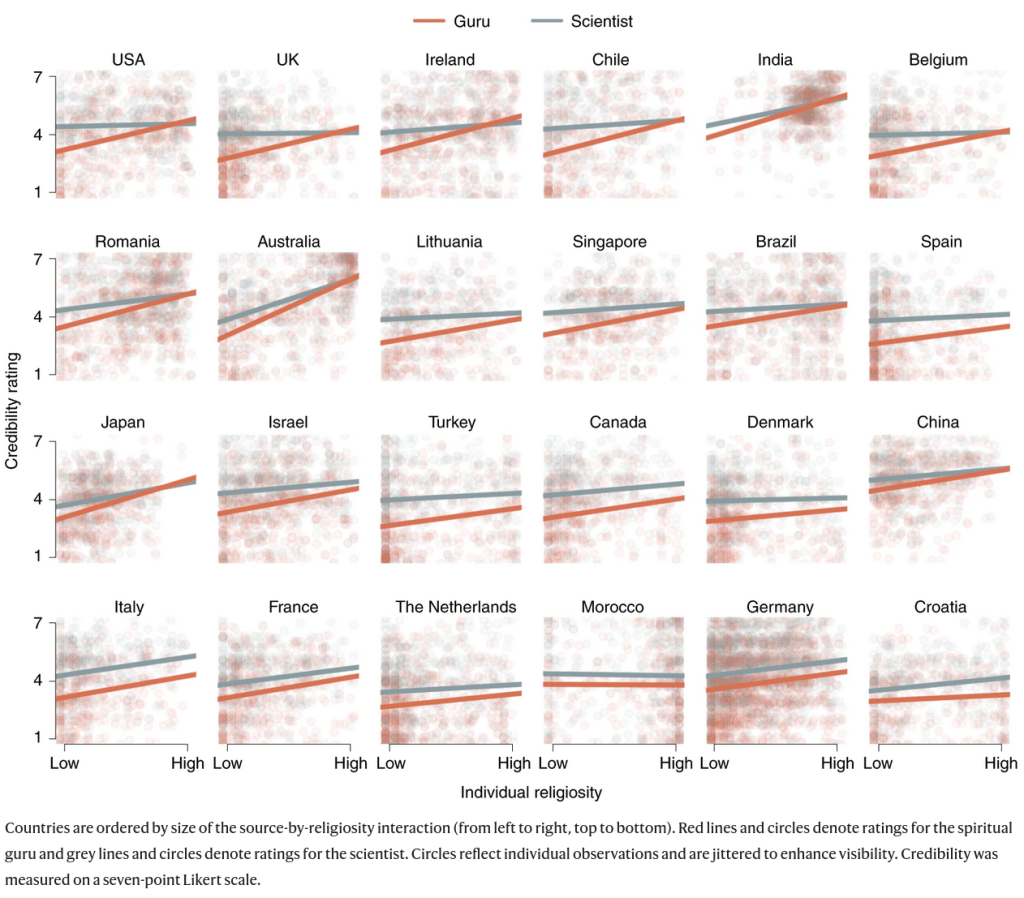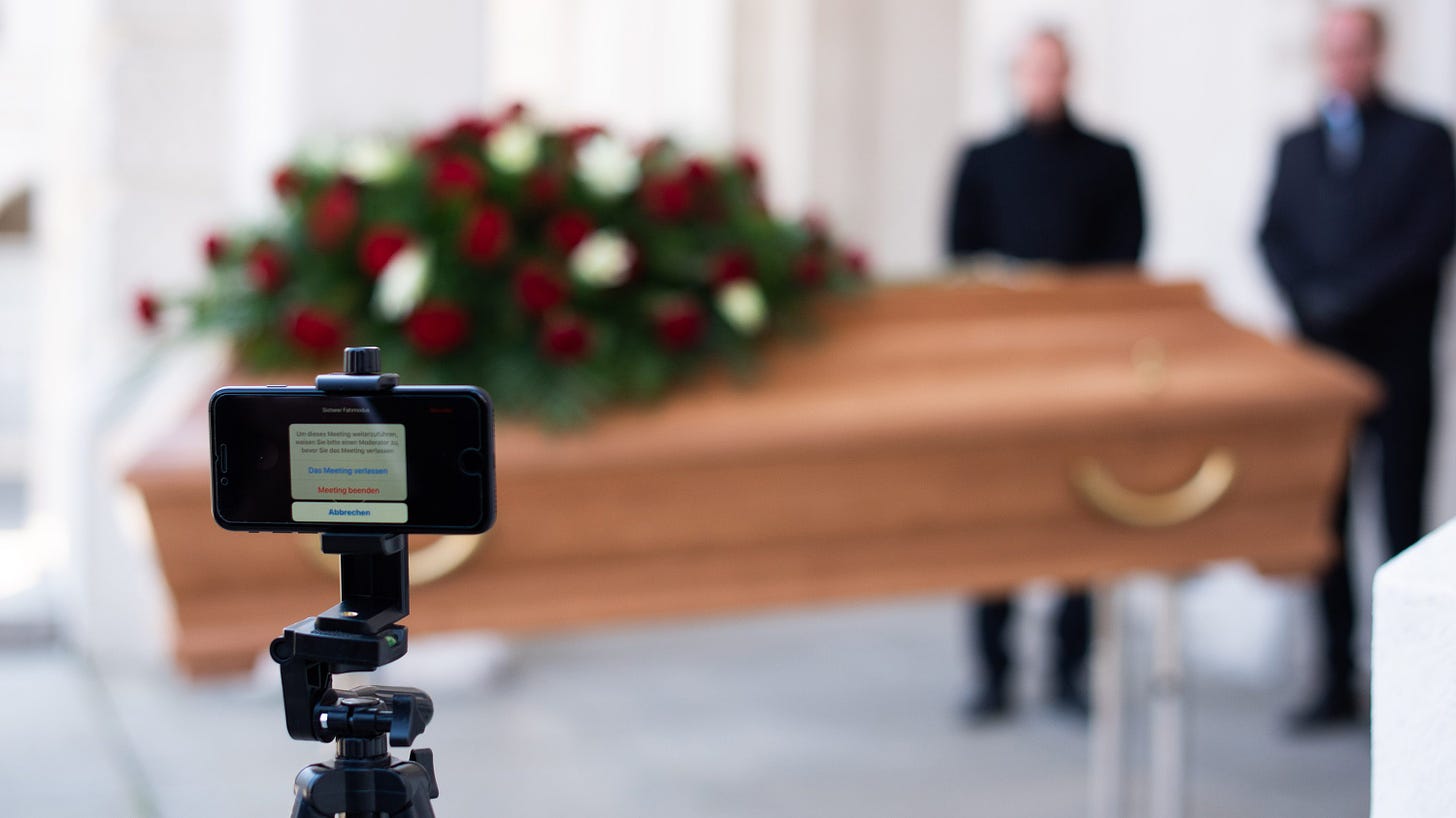“If the religious instinct does not find its satiation in religious activity, it searches for what nourishment it can find elsewhere, in politics and business and education and, for that matter, within the confines of our private lives. Under such circumstances, everything becomes contaminated with unrecognized religious urgings and promptings and produces a zealotry whose intensity and danger is disproportionate to its putative cause. In consequence, it is now incumbent upon us all to engage in a most serious discussion about just what is Caesar’s and just what is God’s, understanding that some must be reserved for the latter, lest what is absolute and divine be attributed to the former.”
Jordan B. Peterson
All human societies studied thus far have (or have had) religions of some sort. According to primatologist Frans de Waals, “There are no exceptions to this.”
The research of De Waals, along with that of sociologists, psychologists and anthropologists such as Robert Bellah, Robin Dunbah, Jonathan Turner and Émile Durkheim, strongly indicates that religion arose out of the burgeoning capacity for sociality in the hominin line that eventually gave rise to our species, Homo sapiens, and in turn served a social need – to bind individuals together, through shared beliefs, rituals and spiritual experiences, into a cohesive group that is capable of working together for the good of all:
“Human solidarities are only possible by emotional arousal revolving around positive emotions – love, happiness, satisfaction, caring, loyalty – and the mitigation of the power of negative emotions, or at least some negative emotions. And once these new valences of positive emotions are neurologically possible, they can become entwined with rituals and other emotion-arousing behaviours to enhance solidarities and, eventually, produce notions of power gods and supernatural forces.”
Jonathan Turner – cited in How and why did religion evolve?
Westernised societies pride themselves on their secularism – that is, separating religious beliefs, practices and institutions from the process of public policy formation and implementation. This separation of church and state has been a tremendous boon for individual liberty, freeing individuals to make life choices congruent with their personal values.
Thanks to secularism, Western societies no longer treat women and children as the chattels of their husbands and fathers, condemn homosexual people as deviants, or persecute people with nontraditional religious or spiritual beliefs (or none at all) as heretics. For these and other gifts of secularism, we can all be truly grateful.
However, the law of unintended consequences is always operative, no matter how benign are the intentions of social reformers, and the secularisation movement is no exception to the rule.
Capacity and need are inextricably related. The religious instinct is quite literally wired into our brains, and because we humans have the neurological and psychological capacity for experiencing complex emotions such as awe, devotion and self-sacrificial love, we also have the need to construct a framework of beliefs that helps us make sense of these deep-seated and spontaneously-arising feelings.
Religious traditions provide us with just such an interpretative framework, but when we reject or lose them, something must step in to fill the void. And in secular Westernised societies, that “something” is increasingly scientism: “The promotion of science as the best or only objective means by which society should determine normative and epistemological values” or, in layperson’s terms, the elevation of science to stand as the only reliable source of knowledge and the best or only objective means by which we can all figure out how to live our lives.
This deification of science is signalled by apparently unironic slogans such “I Believe in Science” – complete with religious iconography, as in this popular meme:
… and in the increasingly widespread use of the definite article – as in “The Science” – to denote the canon of current scientific dogma, with all conflicting hypotheses and presentation of contradictory data condemned by self- or government-appointed scientific authorities (the new priesthood) as “unscientific information… misinformation or disinformation” (the new heresies).
But as anyone who has studied science at even high school level knows, science is a method for discovering truth that is founded on radical scepticism, not belief. The mindset with which scientists approach their work is that we can never know anything with certainty.
However, through the scientific method of observation of phenomena, formation of hypotheses about these phenomena, testing of the hypotheses through experiment, analysis of the data generated through experiment, and either rejection or refinement of the hypotheses on the basis of this analysis, in an endlessly iterative process, we can edge closer and closer to an accurate understanding of observed phenomena.
“Belief” has no place in the scientific method. The edict “follow the science” makes no sense because, as philosopher Matthew Crawford has cogently explained,
“Science doesn’t lead anywhere. It can illuminate various courses of action, by quantifying the risks and specifying the tradeoffs. But it can’t make the necessary choices for us. By pretending otherwise, decision-makers can avoid taking responsibility for the choices they make on our behalf.”
How science has been corrupted: The pandemic has revealed a darkly authoritarian side to expertise
In other words, the scientific method is the best tool humans have ever invented for gathering and analysing information about our world. But it can’t tell us what to do with that information.
For that, we need a moral framework, which was traditionally provided by religion. The deification of science as “The Science” and the elevation of its anointed practitioners to the new priestly caste, whose interpretations of “The Science’s” arcane utterances must never be questioned on pain of excommunication, is the very embodiment of the dangerous situation characterised by Jordan Peterson in the quote that opens this post.
That is, Westernised populations, having largely abandoned traditional religious beliefs and practices, and having found or developed no appropriate alternative for the satisfaction of our religious instinct, have projected the longings engendered by this instinct onto the institution of science.
And science, being wholly unsuitable for this purpose, has become “contaminated with unrecognized religious urgings and promptings… produc[ing] a zealotry whose intensity and danger is disproportionate to its putative cause.”
This zealotry manifests, for example, in a “senior writer” for the Journal of the American Medical Association – whose qualification is an MA (Master of Arts) – thundering from her bully pulpit that doctors who even question the pronouncements of the CDC should be deregistered by their medical boards, and the Department of Homeland Security issuing a National Terrorism Advisory Bulletin which labels anyone who purveys what it describes as “false or misleading narratives” about COVID-19 as “domestic threat actors” – aka domestic terrorists.
These calls for excommunication from the Church of Science for heresy, and fatwas against infidels, are the inevitable result of attempting to satisfy the religious instinct with an institution wholly unsuited to the task.
The canonisation of St Anthony “I Am The Science” Fauci by the corporate press in the US has spawned great satire from the Babylon Bee:
… but the Devotional Prayer Saint Candles are actually a real thing:
(get yours today for just US$22.50 + p&h!).
We’ve all seen the press conferences in which public health officials and politicians preach nonsense about “protecting yourself and others” with symbolic clothing items that do nothing to stop the transmission of viruses and injections that don’t prevent infection with, nor transmission of, SARS-CoV-2 (St Christopher’s medal, anyone?), whilst the acolytes in the press corps reverentially transcribe and promulgate their utterances as if they were the Sermon on the Mount.
But increasingly we see even those who self-identify as religious imputing importance and credibility to scientists (or anointed representatives of The Science™) who make nonsensical pronouncements.
For example, a team of psychologists presented meaningless but profound-sounding statements to over 10,000 individuals from 24 countries, attributing them to either a scientist or a spiritual guru, and found that all around the world, scientists’ claims are seen as more credible than those of spiritual gurus, even among the most religious subjects.
The researchers used the New Age Bullshit Generator (which combines new age buzzwords in a syntactically correct structure, resulting in meaningless but pseudo-profound texts) to formulate two statements of nonsensical verbiage, referred to by the researchers as “gobbledegook”, although they noted parenthetically that it is “also referred to in the literature as ‘pseudo-profound bullshit’” – who knew there was a literature on such matters? – as follows:
“We are called to explore the cosmos itself as an interface between faith and empathy. We must learn how to lead authentic lifes [sic] in the face of delusion. It is in refining that we are guided” and
“Yes, it is possible to exterminate the things that can confront us, but not without hope on our side. Turbulence is born in the gap when transformation has been excluded. It is in evolving that we are re-energized.”
They then presented the gobbledegook statements to participants, attributing them in random order to either “Edward K. Leal—a scientific authority in the field of particle physics” (depicted as a man in an old-fashioned suit) or “Saul J. Adrian—a spiritual authority in world religions’’ (depicted as a man in robes).
And from Australia to Turkey, and China to the USA, the vast majority of participants were more likely to view nonsensical drivel as important and credible when it emanated from the mouth of a “scientist” than from a “spiritual guru”, although those who described themselves as religious found the spiritual guru’s words relatively more credible than the non-religious participants.
It is not at all reassuring that religious Australians appear to be some of the most gullible people in the world. Perhaps we could take some lessons in healthy scepticism from the practical, no-nonsense Dutch:
Lead author of the study, University of Amsterdam psychologist Suzanne Hoogeveen, opined that
“Our findings suggest that regardless of one’s worldview, science is seen worldwide as a powerful indicator of the reliability of information. In these times when there is a lot of talk about skepticism with regard to, for example, climate change and vaccinations, that is hopefully reassuring.”
Really, Ms Hoogeveen? That’s your conclusion – that we’re better off believing bullshit from scientists than bullshit from spiritual gurus? In what way is it “reassuring” that most people in the world rate arrant nonsense as “important” and “credible”, but only when intoned by a priest in the Church of Science?
Bullshit is bullshit, no matter whose anointed lips it emanates from. What the public needs is training in bullshit detection, not habituation to accepting bullshit from “credible sources”.
That training starts with an acknowledgement that while the scientific method is objective and values-neutral, scientists are not. They are human, and they bring to their work all of the human emotions that can cloud, distort and derail that work, including pride, envy, jealousy, fear (of social rejection, failure and ignominy), craving for honour and recognition, lust for power and control, and good old-fashioned greed.
And, as Matthew Crawford explains, the image that non-scientists hold of scientists and science is a far cry from the way that science is actually conducted in the 21st century.
Science is no longer an activity of “independent, self-motivated truth-seekers”; instead centralised funding and organisation has bureaucratised scientific activity, rendering it “fundamentally corporate” and “primarily organised around ‘knowledge monopolies’ that exclude dissident views”. Few scientists have the luxury of simply pursuing their interests, no matter where they lead; the vast majority are dependent on grant funding which is unavoidably political:
“As a practical matter, ‘politicised science’ is the only kind there is (or rather, the only kind you are likely to hear about).”
How science has been corrupted: The pandemic has revealed a darkly authoritarian side to expertise
It is hardly surprising that certain individuals within the scientific community have personalities that render them highly susceptible to the allure of becoming the high priests of the new official state religion of scientism. Why would we ever think otherwise? There have always been individuals who wish to control and dominate others, and to marginalise and persecute those with different views.
When science is delegated the responsibilities for meaning-making and norm-defining that were formerly undertaken by religion, scientists with authoritarian leanings will relish the opportunity to impose their worldview on dissenters – both within and outside the scientific community.
And lest anyone labour under the delusion that a scientific dictatorship would be any less intolerant, brutal and repressive than a religious dictatorship, it bears remembering that the democidal regimes of Stalin and Mao were informed by scientistic rather than religious principles.
Jordan Peterson invokes Jesus’ admonition to “Render unto Caesar the things that are Caesar’s, and unto God the things that are God’s” to remind us that if we do not find appropriate means of channelling our religious instinct, with its accompanying drives to engage in social cohesion-promoting rituals and costly behaviours such as altruism and even self-sacrifice, we will be driven toward entirely inappropriate means of expressing this instinct.
Widespread continued adherence to the pointless and costly ritual of mask-wearing even when its most ardent evangelists have recanted their faith, and the willingness to submit one’s own children to a medical sacrament which offers them zero tangible benefits whilst incurring the risk of catastrophic harms, including death, are just two of the deeply worrying consequences of this misdirection of the religious instinct. “Belief in Science” has become a cult which endangers the mental and physical well-being of its adherents (not to mention their children), and threatens to rip apart the social fabric. In a very real sense, it threatens our humanity.
Because when we render unto science what does not belong to science – the personal and societal responsibility for answering the deep, important questions about how to be good, how to raise our children, how to care for the sick and dying, how to grieve our lost loved ones, how to resolve our differences – dystopian insanities such as these are spawned:
Science can provide us with data that can inform our thinking about these important questions, but it cannot answer them for us. Such questions can only be answered through deep, personal reflection and fearless, frank and open discussion with our fellow humans – in person, as humans have always done when confronting important issues.
It is up to us, not The Science™, to grapple with those questions. Science can tell us about transmission dynamics and R nought values and how immunity develops after infection versus inoculation.
But it cannot provide answers to the most urgent questions that secularised Western societies are currently asking: How do we order our social, economic, educational and medical priorities in the face of a respiratory virus that is highly contagious but starkly risk-stratifed by age and comorbidity status?
Do we wish to live in a world of human values, where our children grow up seeing the expressions on their parents’, friends’ and teachers’ faces, and hug their Grandmas; where we hold the hands of our dying loved ones and mourn their loss together; and where we are free to make our own, fully informed decisions about the medical treatments we undergo?
Or do we wish to become “transhuman” and live in the technocrat’s vision of paradise, where our physical, digital and biological identities are merged (via implantable microchips that can read our thoughts, as explained in Klaus Schwab’s book Shaping the Future of the Fourth Industrial Revolution which is unselfconsciously subtitled ‘A guide to building a better world’)…
… and in which we gradually morph into cyborgs:
“Fourth Industrial Revolution technologies will not stop at becoming part of the physical world around us—they will become part of us.”
Shaping the Future of the Fourth Industrial Revolution: A guide to building a better world
How do you want to live? This is the time for you to make a conscious choice, and once you have chosen, express that choice in your every action, and do not cede your right to choose to anyone, ever again.
UPDATE: C.S. Lewis was (unsurprisingly) way ahead of me:












Robyn, thanks for another fantastic article that gives another perspective in which to view what is happening from. Most people seem to be coming from the position of the science is settled and won't even consider questioning it. I sent this quote to my "leadership" team at work.
The mark of an open mind is being more committed to your curiosity than to your convictions. The goal of learning is not to shield old views against new facts. It’s to revise old views to incorporate new facts. Ideas are possibilities to explore, not certainties to defend. Nothing!
There seems to be a mental block where they just cannot fathom there are different opinions or different interpretations of the science.
You can see the Milgrim Experiment in action when a response from emplyer is -
We are not in a position to choose to not follow the Order. We are simply following our legal obligation to comply with the contents of the Order, and have made a lawful and reasonable direction to employees that they must be vaccinated in order to attend sites.
As if they can't possibly do anything else except follow orders. A lot of them are good people to.
I hadn't seen the CS Lewis video either, but came across one of his quotes a while back that sums up good people following the science -
Of all tyrannies, a tyranny sincerely exercised for the good of its victims may be the most oppressive. It would be better to live under robber barons than under omnipotent moral busybodies. The robber baron's cruelty may sometimes sleep, his cupidity may at some point be satiated; but those who torment us for our own good will torment us without end for they do so with the approval of their own conscience.
Robyn, Thank you for this article!!!! We as a human race have lost our direction in the World.
We are being taken over by the Spider Web of groups who are out to destroy us!
Take a look at my country Canada and the Trudeau Communist Government, it was a Healthy Protest. Trudeau would not even talk to them! " SEND IN THE THUGS GRAB THEIR MONEY"
People remember this! The government works for us! We don't work for them! Our taxes pay their wages!!